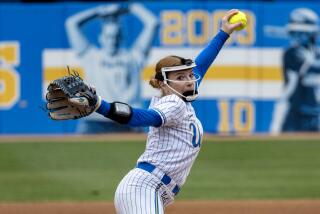UCLA Coach Has Few Regrets Over Incident
- Share via
On this day, Gary Adams is tucked away in a corner of UCLA’s Morgan Center answering phones and trying to explain himself. He is watching videotaped news reports from the last few days detailing his transformation from beloved baseball coach of the Bruins to the man who ordered his pitcher to throw at an opposing batter.
He is answering every question. He is looking nothing like himself.
Not once in his 22 seasons at UCLA has Adams missed a game, but on this day he was squirming uncomfortably in a chair at the start of a six-game suspension, wearing a pair of jeans and wondering how his team was faring against Cal State Dominguez Hills at Jackie Robinson Stadium. Wondering yet again how he got himself into this.
But then quickly finding the answer.
“Every time I think to myself why this is all going on, I think back to March 30 and what happened to Troy [Glaus],” Adams said. “I think about running out there as he lay on the ground and wondering, first, if he was alive or dead and, second, if his career was over.”
That is when it began for Adams, in Tempe, Ariz., when Arizona State pitcher Ryan Bradley beaned Glaus, a Bruin sophomore, knocking him unconscious for five minutes. Most of the attention the last few days has centered on Adams’ decision last Sunday to order Bruin pitcher Pete Zamora to hit an Arizona State batter, but for Adams the ordeal began with Glaus lying on the ground.
“I called Bill Thurston, the chairman of the NCAA’s baseball rules committee, the Monday after Troy was hit and told him what had happened and what I thought needed to be done,” Adams said. “As I hung up, I really started to think about what it would take to stop coaches from allowing their pitchers to throw at batters.”
He didn’t see it then, but Adams would send the NCAA a message again. Thurston had encouraged him to put something in writing for the committee to review, and he intended to do just that. But Saturday at UCLA, after Bradley hit Glaus again, this time an act ruled unintentional by the umpires, Adams knew he had to do something more.
“I met with the team and I told them not to do anything, that I would do something,” Adams said.
Adams told Zamora to hit the first batter he faced on Sunday, Sun Devil Mikel Moreno.
From that point, from the time the second pitch of the game hit Moreno in the upper leg, Adams has been questioned. And he has been asked not so much why he did it, but why he admitted to it.
“There have been times when it is implied that a coach ordered a player to throw at a batter,” Stanford Coach Mark Marquess said. “But I have never heard of a coach admitting it.”
Adams said he was honest because he knew he had to be.
“People said to me, ‘The umpire said you did it intentionally,’ and I couldn’t lie and tell them the umpires were wrong.”
He also wouldn’t tell Zamora to lie. He didn’t want either of them to fake it, to contribute to the problem.
They had hit one of his kids, not just a player, one of his family. And that prompted Adams to give the order, and then, to make an example of himself.
Zamora and Adams were ejected from the game; Zamora was suspended for four games under NCAA rules and Adams one, though Adams then suspended himself for three more so his penalty was equal to Adams’. Then the Pacific 10 Conference tacked on two nonconference games UCLA recently scheduled.
“I am even thinking about suspending myself for one extra game so that my suspension is a game longer than Pete’s,” Adams said. “Because the coach can control the player. The coach is ultimately responsible for the actions of his player. If the coach knows he is going to be the one suspended, then he and the pitcher will think before throwing at a batter.”
Adams has only one regret, that he got Zamora involved and then suspended. After he and the sophomore pitcher had been ejected from Sunday’s game, Adams followed Zamora to the UCLA clubhouse. He stood before his player, who was sitting at his locker with his head down.
“I just told him I was sorry,” Adams said. “That I was sorry for making him do it. But I also said that what he had done, what we had done, was make a statement for our team and to college baseball.
More to Read
Go beyond the scoreboard
Get the latest on L.A.'s teams in the daily Sports Report newsletter.
You may occasionally receive promotional content from the Los Angeles Times.






